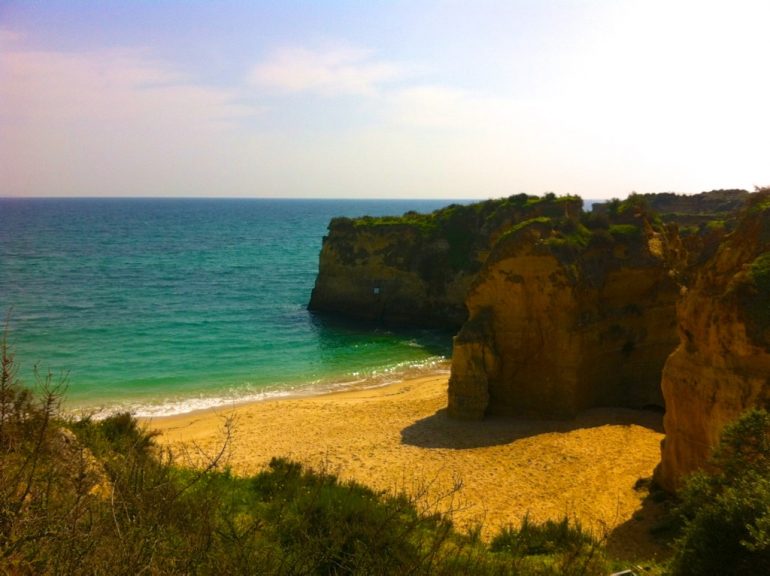A wrecked taxi spits me out at the pier on the Ayeyarwaddy. In an instant, I am surrounded by a hord of kids in dirty, ragged clothes. They follow me laughing and gesturing. There are hundreds of people walking around in the harbour, but I don’t see a single ‘long nose’ (Westerner) anywhere. Instead, there are interested faces and waving hands wherever I look. Even the most grim looking locals light up with a smile when I greet them with my first word in the local language of Myanmar, “Mingalabaa”.
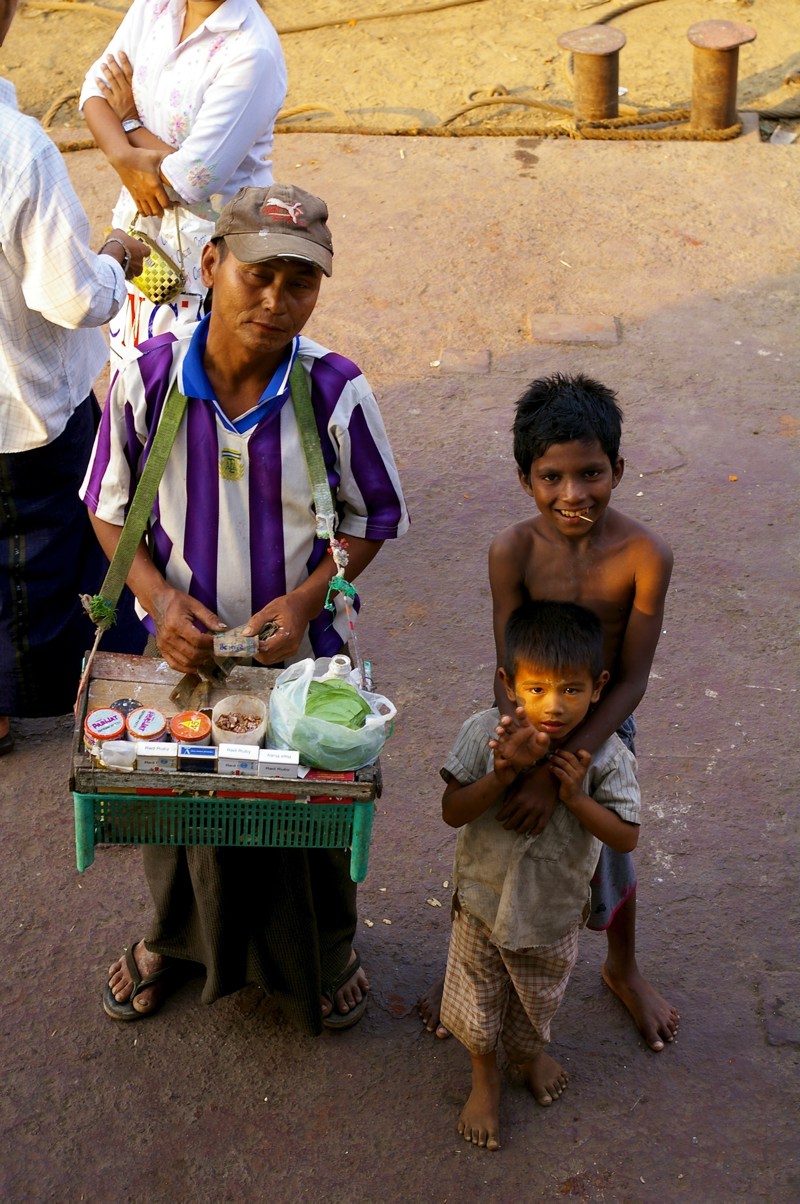
An old tobacco vendor guides me to my cabin on the first floor of the old boat. Two rancid beds, a fan, the windows are locked with wooden wedges. I throw my stuff inside and quickly lock the door with my miniature lock, then I climb back down into the crowd. Wiry, dark men load things into the belly of the ship in an impressive speed – bags, barrels, boxes, wood, steel, plastic, vegetables and live animals. I am watching the sweaty busyness from a metal staircase at the side.
Every five minutes, someone else tries to sell me something: Drinks, fruits, rotis, tobacco. A saleswoman of maybe 10 years is particularly persistent. She just keeps looking at me with her big dark eyes and her well-proportioned face. Streaks of Tanaka, a yellow-white paste made from wooden bark, protect her cheeks from the sun. She just keeps asking: “Water?” Even though I already have two bottles, I finally end up paying her a ridiculous price for another one. Luckily, just before taking a big sip of it later on, I notice that its seal is broken. I have bought tap water, if not river water.
Then the old guy who has showed me to my cabin has his turn. After he has asked me about 46 times, I buy a half-full pack of cigarettes from him, even though I don’t even smoke.
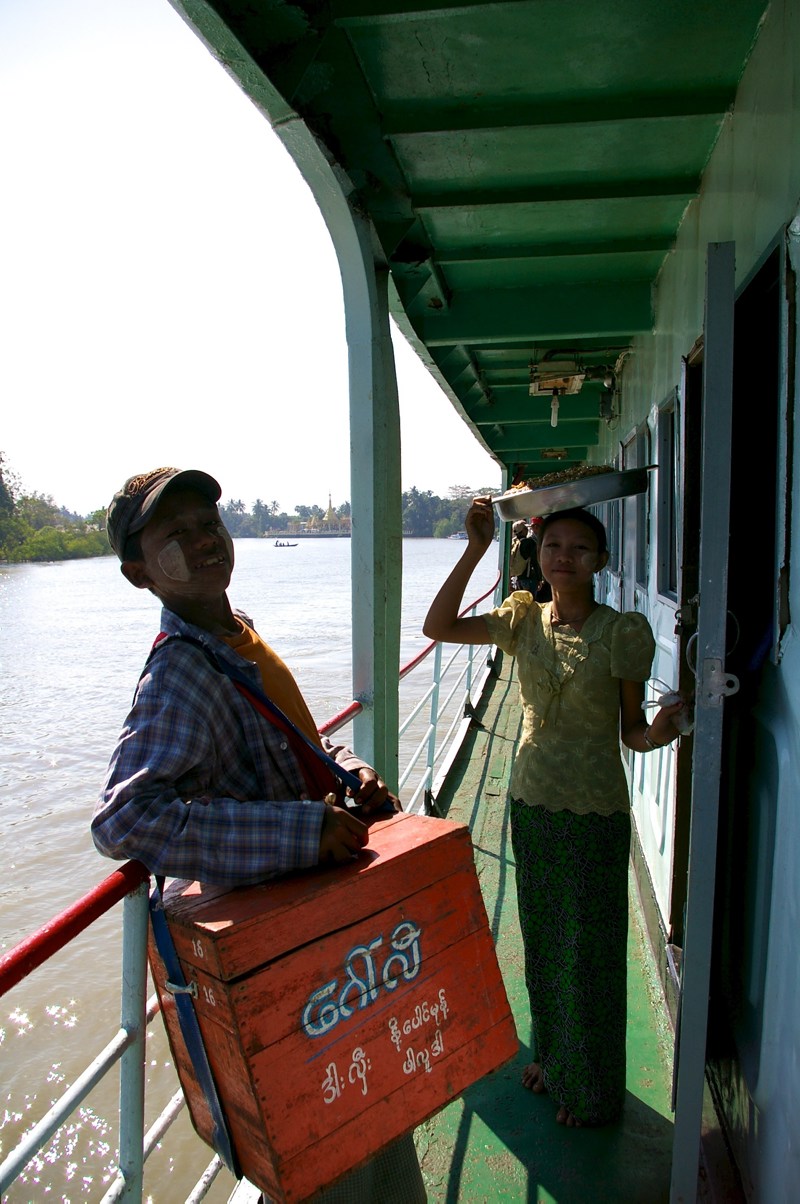
After about an hour we finally cast off. Young men untie the heavy knots and jump off to the mainland in the last moment. The boat now floats West downriver through the brown water of the Ayeyarwaddy. Destination is Pathein, right in the middle of the big Ayeyarwaddy’s delta, South East Asia’s rice bowl. A flock of seagulls follows us for a few kilometers, eating everything they can get their beaks on.
The moloch Yangon passes by, the golden Shwedagon pagoda remains in our sight in the distance for a while. Then it slowly gets quieter along the shore. Small bamboo huts now replace the big concrete buildings, palms and mangroves take the place of the fortified banks. Fishermen pass us in slim wooden boats. Water buffaloes bathe in the shallow, sandy water, kids splash around naked. Big groups of white birds populate the tree tops, scattering every time the kids on the deck below me clap their hands.
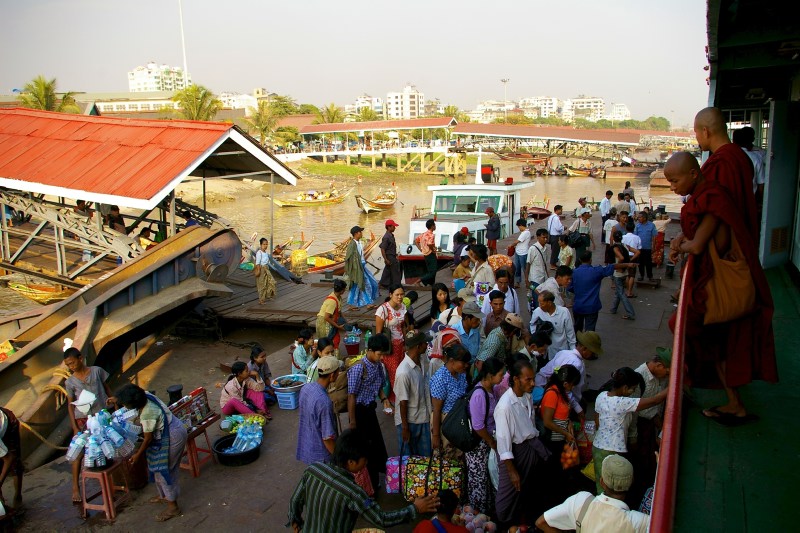
On board, a very pleasant quietness settles in. Everybody has resigned themselves to the next hours which simply serve the transport from one place to another. A gap in time, abruptly downshifitng the bustle.
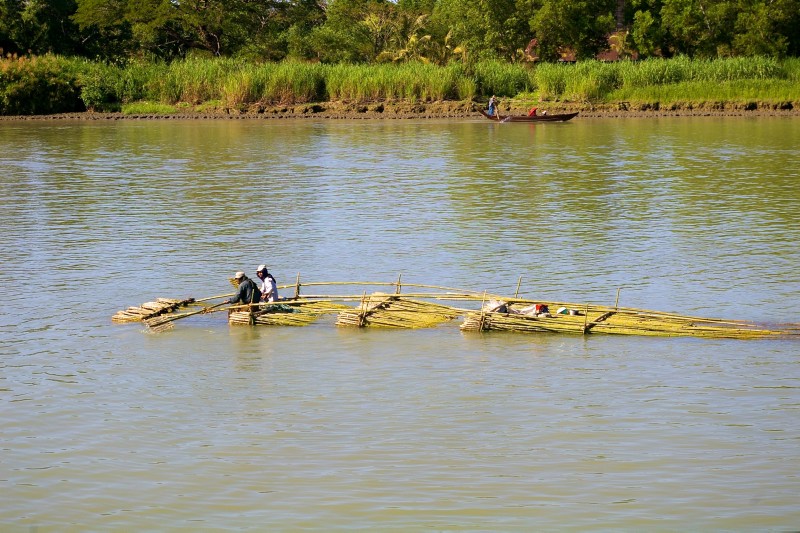
The whole lower deck is full of people. You have to carefully put one foot in front of the other in order to cross this tangled mass of sleeping and eating people, animals in cages, bags, boxes and pots. This is one of the situations where the Bhuddist stoicism is at its best. People basically walk through other people’s beds, but there is never any complaining about it, not even a criticizing look. Everybody just patiently moves away as much as necessary. This is nothing worth talking or even getting aggrevated about.
I am very fascinated by the atmosphere on board and spend no minute longer than necessary in my moldy cabin. Standing at the railing on the upper deck, a refreshingly cool breeze is blowing in my face. The boat floats at a leisurely pace, the river is getting wider and wider as we go. The ruthless sun has already lost its power, the burning red disk is now starting to touch the tops of the palmtrees.
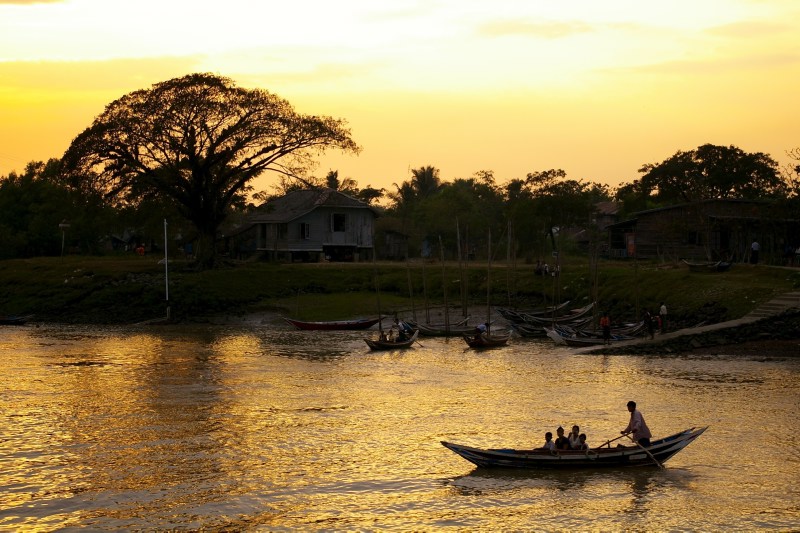
The people on board eat food they have brought along in detachable metal pots. They smoke, they play guitar, they pass time with board games. There are tiny babies wrapped in towels, right in the middle of all the pots. Infants climb around close to the railing. Everything the people don’t need anymore – bags, food leftovers, betel spit – is being thrown straight into the water. There is an almost meditative silence above the whole scene, the monotonous chugging of the huge boat engine is doing its bit.
I am taking pictures of the sunset when a monk in red robes addresses me. It is the novice U-Do, my cabin neighbour. After a few minutes of conversation, I tell him about the meditation retreat I did in the Golden Triangle a few years ago. He seems interested and tells me that he himself is a student of a meditation school in Yangon and that he is currently travelling with a delegation of 40 people in order to teach in the river delta.
“Would you like to discuss meditation with the teacher?” It is a question which does not seem to leave a lot of options. Thoughtfully scuffling, the monk with the shaved head leads me to the upper deck where there are two more men in red, sitting on a wooden podium between tidily arranged bast mats. They are resting in the lotus position and staring straight ahead. I am asked to sit right next to them, U-Do pours me some green tea.
Almost in slow motion, the teacher turns his head to me with a sublime smile around his mouth. In perfect English he explains to me that he is an internationally acclaimed meditation teacher, travelling around the globe in order to spread his teachings. Soon after this excursion in the Ayeyarwaddy delta, they will all be going to the States.
Very gently and with what seems like minute-long pauses he explains to me what meditation is really about. The credo is: “Only misunderstanding is true.” In other words: Everything we think is true is nothing but an illusion, generated by the unavoidable corruption of our sensory organs. One should always keep this in mind, he stresses. Furthermore: No meditation without wisdom, no wisdom without meditation.
In the middle of our conversation, his mobile skirls with an obnoxious ringtone. For him this does not seem to contradict his abstraction. He answers the call and efficiently finishes the conversation within seconds, then he turns towards me again. Again, he takes a lot of time for phrasing his sentences. After half an hour of ‘dhamma talk‘ I return to the deck below, I am feeling exhilarated.
This river journey truly is an adventure. I am the only Westerner on this rusty ship full of people who could not be more exotic. I am in the middle of strong smells which I cannot place, noises which I don’t understand and gestures which I can’t interpret.
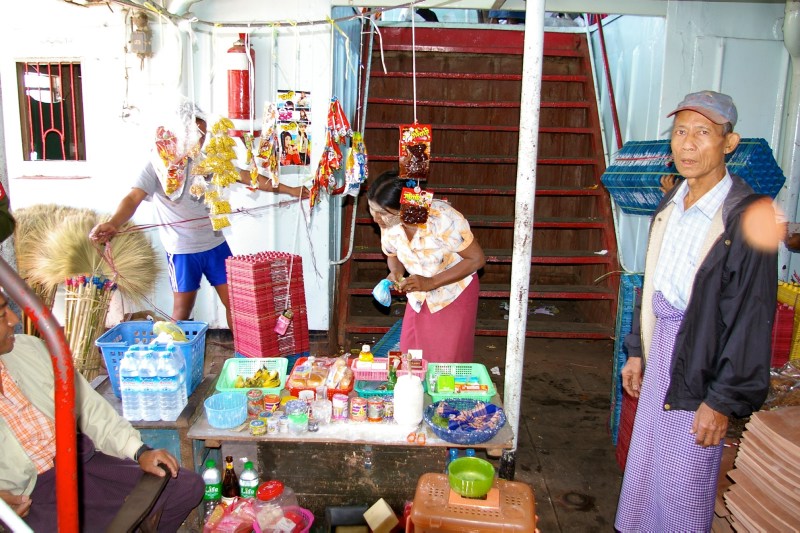
One deck lower, I ask for something to eat. But unfortunately, there is nothing but fish crackers. I buy a few for dinner, as I haven’t brought anything to eat along. While I am chewing the bland food, I watch a man trying to sell something right in the middle of all the passengers and goods in a loud voice. I get curious and inquire with the people around me for information on the product he offers. But nobody understands what I want. Suddenly, the vendor turns towards me and loudly says: “Lotion for skin”. In a matter of seconds, all 70 heads turn around and look at me in amazement as if they just saw me for the first time. Who is the exotic now? It’s all a matter of perspective.
The day has turned into night. Big fires light the banks of the river now, the smell of smoke is waving over the water. Long swathes in front of the red background, studded with the outline of palmtress and a pagoda here and there, make for a fantastic panorama. Fishermen sit in their boats with blinking lights, patiently waiting for their catch with the nets cast out far.
The headwind is very pleasant, the boat always goes at the same unhurried speed. It actually feels like I have personally made friends with the boat.
Most of the people on board are sleeping now. Many of them lie in positions which don’t look comfortable, jammed in between luggage and railing, at the foot of the stairs to the upper deck or in front of the latrines which are being flushed with river water.
I am standing at the railing and doing absolutely nothing. An elation settles in. After all, those are the moments the modern traveller is looking for: Simplicity, clarity, nativeness.
A pretty young woman addresses me in Oxford English. Deborah, a Christian from Yangon, is on her way to the wedding of her sister-in-law at a village in the delta. As Burmese people don’t travel a lot in general, they are very prone to travel sickness when travelling in busses. She explains to me that the boat is a slightly more pleasant alternative. She tells me about her family and her job as a housekeeper for a Dutch businessman which explains her flawless English.
More and more of her relatives are joining our little conversation, first the niece, then the aunt, then other less closely-related people. All of them are amazingly friendly and we just keep chatting away through the early night. When they find out that I haven’t eaten anything yet, there is an outcry of disbelief going through the whole family. Only moments later, I am given numerous delicious snacks from their family supplies.
We stand at the railing for hours and talk about all the world and his brother. Meanwhile, the niece and her friend quietly sing Myanmar Hip Hop songs and flirt with the boys on the deck below. I give the cigarettes I bought earlier to Deborah’s aunt, so everything comes full circle. After receiving a kind invitation to a family meeting in Yangon after my trip, I finally go to my cabin and fall asleep with a blessed feeling.
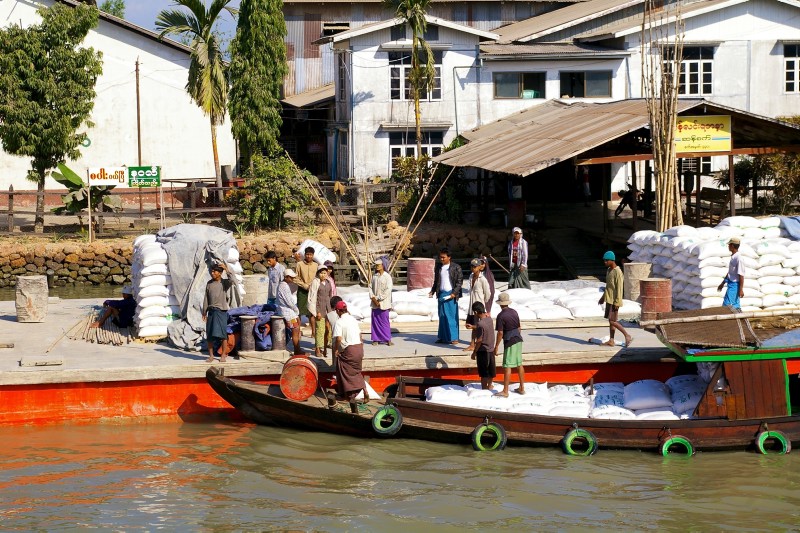
I wake up at dawn, just in time to see Deborah and her family leave the boat waving. For the next hour, I watch the people load and unload goods. It is an oiled machine composed of strong, brown men in Longyhis and undershirts. Precise, powerful, impressive to look at. As soon as all things have been moved, a whole legion of vendors comes running onto the boat. Everybody wants to be the first one to offer the passengers the dishes they have just prepared at home. I buy some vegetable samosas which are delicious. All of a sudden and out of the blue, someone begins massaging my back. Slightly confused, I turn around and see an old shriveled man whose power in his lower arms contrasts starkly with the rest of his appearance. I don’t fight the kneading, but enjoy the relaxation of my bones after the hours on the hard bed in my cabin. It doesn’t matter that I already know he will charge me a fortune for it.
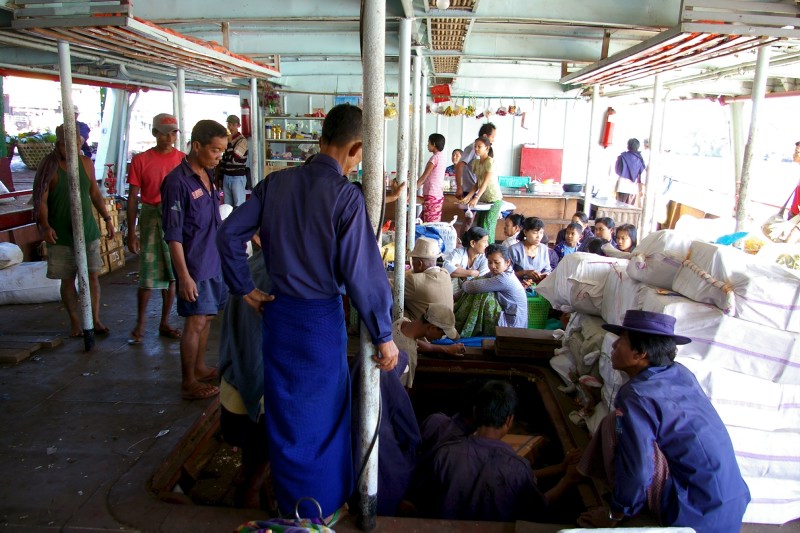
Another thing I have figured for a while is that our arrival will be delayed for a few hours. According to schedule, we should have reached the port where Deborah’s family got off already at 2 in the morning. I have now adapted to the speed of the boat and am moving in slow motion when I make my way down to the lower deck again. It is a little less crowded here now.
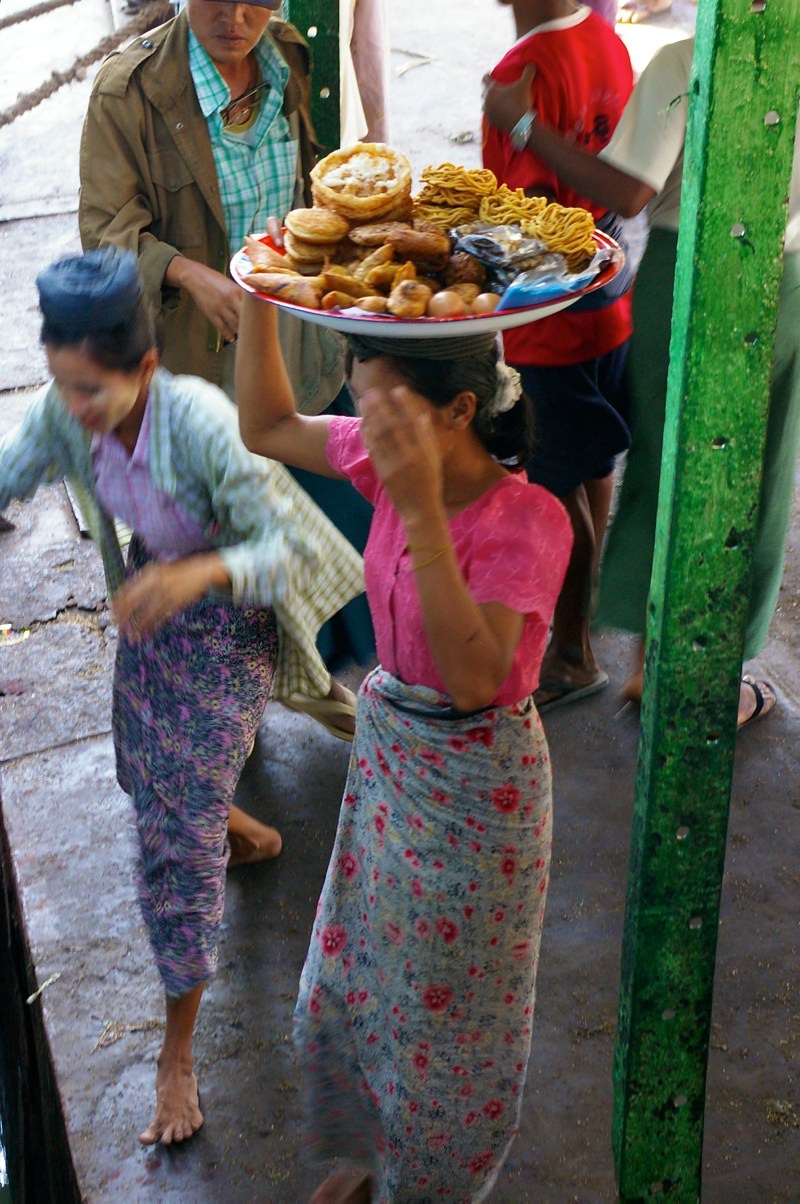
While we are passing palmtree groves, rice fields and golden pagodas in the sunrise, I sit at the greasy wooden bar of the ‘board restaurant’ and make myself an instant coffee in a plastic cup full of stains. A young guy wants to drink whisky with me, but I decline. Instead, I am waving one of the betel vendors over. I have watched the process plenty of times already. You spread lime paste on a green leaf, then you sprinkle the pounded betel nut as well as some chewing tobacco on top. In the end, you fold the leaf carefully. The locals then shove the whole package into their mouths and chew on them perseveringly, constantly spitting out the red juice as they go.
Almost every man and even a lot of women indulge in that hobby, their red teeth and sometimes blood red lips being an ever visible evidence. But I’m not ready for this yet. Instead, and for the first time, I buy a handful of Cheroots, the green, slim cigars which are mostly smoked by women. They cost about a cent a piece. Then I puff away, standing at the railing and making some of the locals smile when they see me.
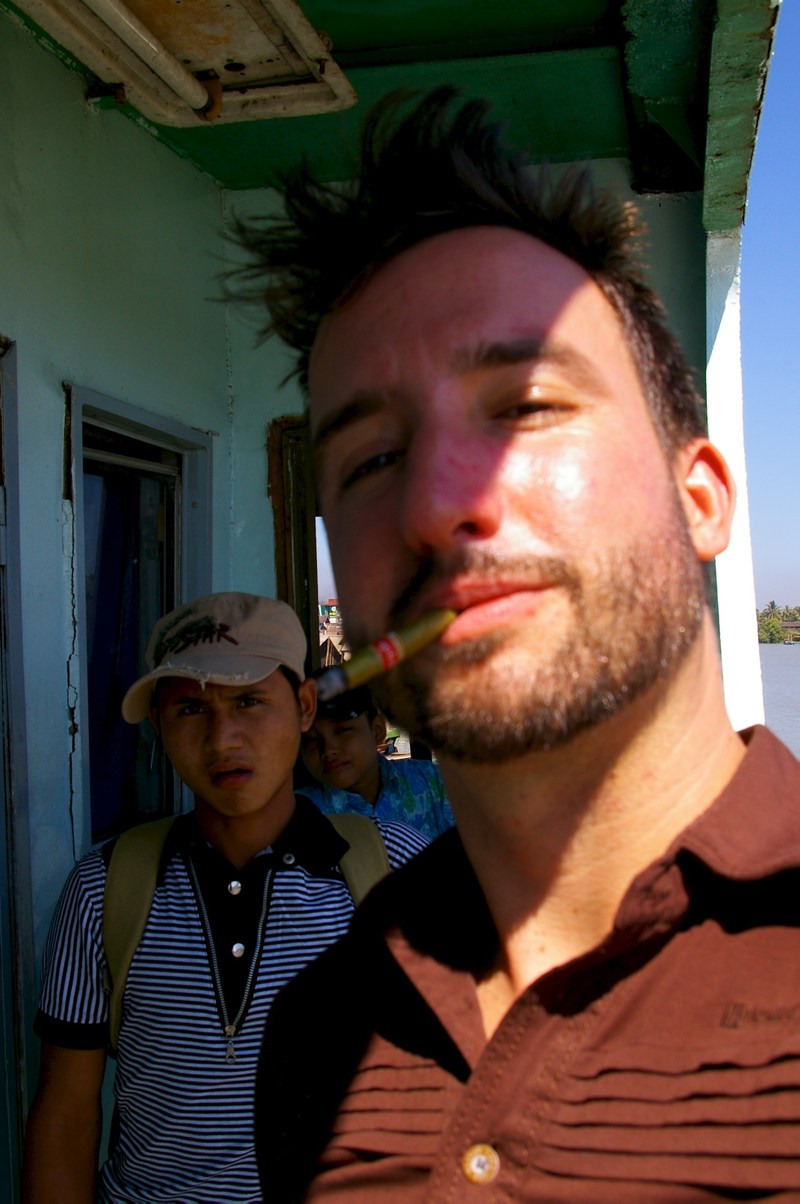
Kuna, Tiuesto, Pota and Sua Sule, three boys and their mom join me when I unpack the guitar I have just bought in Bangkok and play a few tunes. Later on, I show them my travel book and they teach me how to pronounce all the places. The smallest of them keeps his eyes glued on me. He follows each of my movements with fascination, as if he was watching a really strange being.
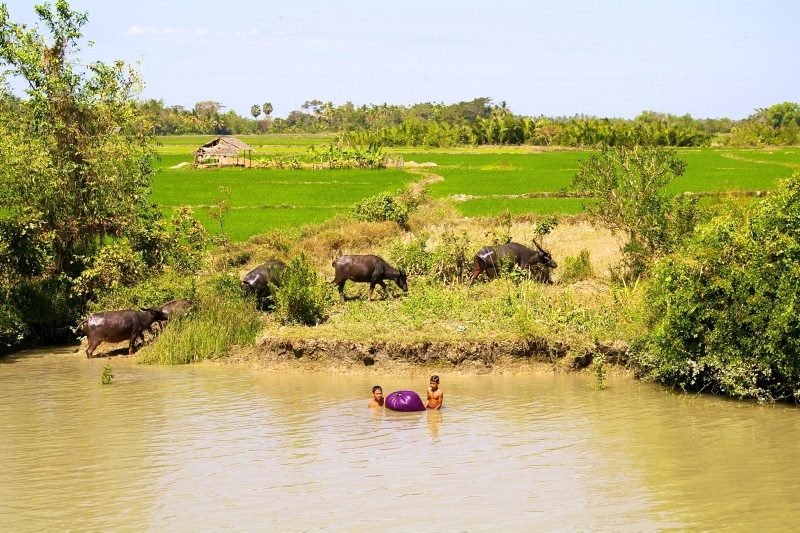
U-Do calls me for lunch from above. The meditation group dishes up plate after plate of chicken, fish, unidentifiable sauces and the omnipresent green tea. Meanwhile, the two teachers are sitting on their podium, reading the international news in the paper. I keep thanking everyone for their generosity, but they don’t really seem to understand why I would do that.
On my way back down again, a very old man approaches me with a bent back. He smiles at me with no teeth and gives me two coffee sweets. This is not the first time I am almost moved to tears by the friendliness of the people here.
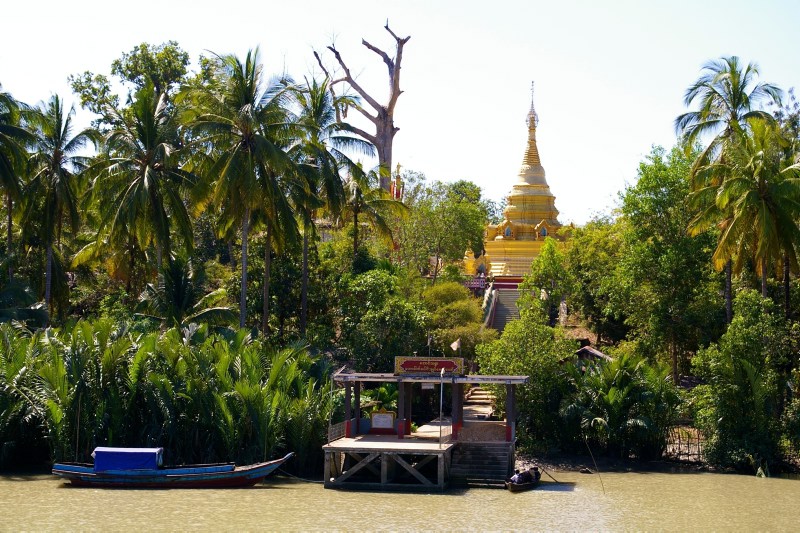
Back down, I drink another coffee. The whisky guy has probably finally found some sleep, he has disappeared. A group of people feasts on rice and curry next to me. Within seconds, they offer me to join them. It takes me a while to explain to them that I have already been fed sufficiently by the monks and that I really can’t eat anymore. But after smiling and gesturing for a bit, they finally accept my excuse. I ask the man behind the counter and his co-workers for the estimated arrival time and get very contradicitg informations from each of them. But by now, I couldn’t care less when this journey is over. Time really is a very expansible notion.
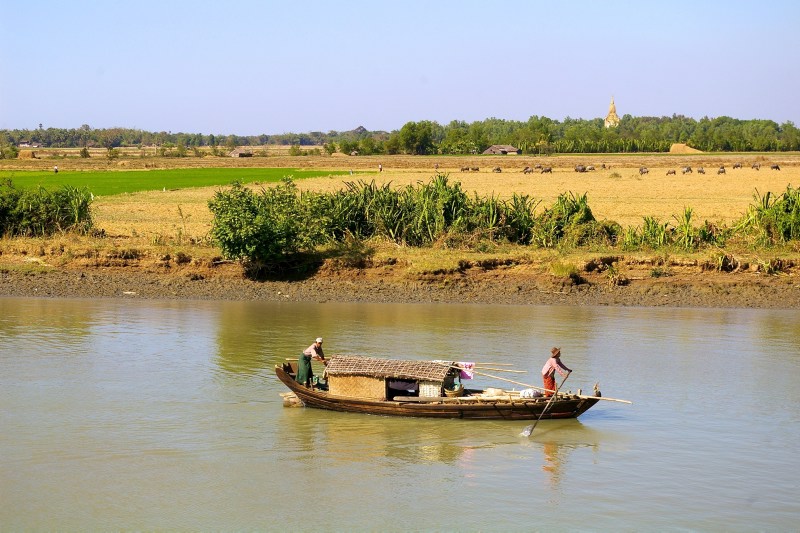
Around 5 PM we finally enter the port of Pathein which is located in the curve of the river and currently is all billows of smoke and pagodas twinkling in the afternoon sun. I have been told that we would reach our destination at 11 in the morning.
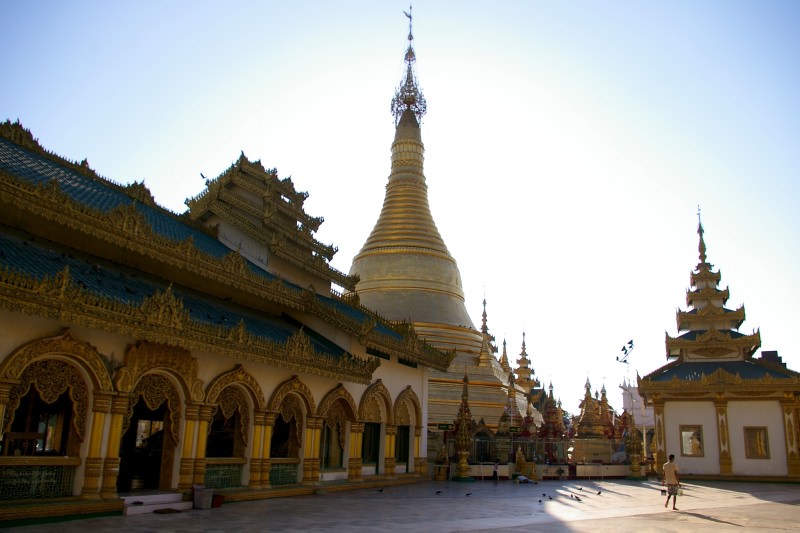
The barge makes its way to the pier through an army of fishing boats. On the pier, there is an impressive group of people already waiting for us. I push myself past burden bearers and baskets and get into a rikshaw to the centre. I won’t be going any further today as planned, as the sun is once again on its way towards the tops of the palmtrees. I am staying in Pathein. And it looks like quite a nice little town!
This post is also available in: German

